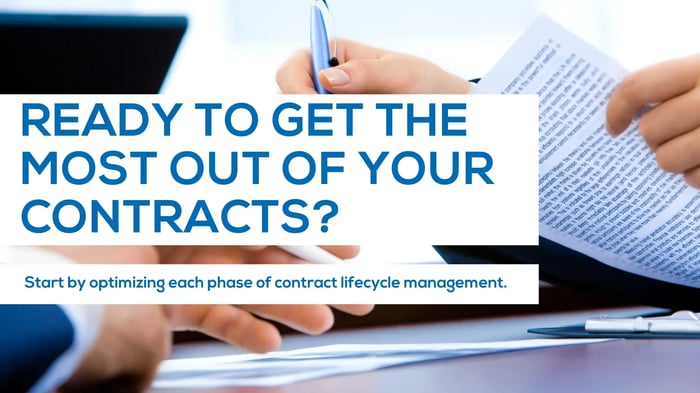
The 3 Phases of Contract Lifecycle Management
Contracts are an essential component to every business. In any industry, contracts play a crucial role to ensure that products and services are appropriately delivered, that agreements are kept, and that obligations are fulfilled. In today’s business environment, contracts remain as one of the most important pieces of the entire business operations puzzle.
Contract lifecycle management is comprised of three main phases, and the level of efficiency of each can support you in driving business results. A subpar approach to contract lifecycle management can cause bottlenecks and avoidable roadblocks within your contracting activities. However, by standardizing your approach to each contracting phase, you can effectively increase the value of your contracts and strengthen your management strategy. And the result? Shortened contract lifecycles, saved time and money, and increased compliance.

So, what are the three phases of contract lifecycle management?
Contract lifecycle management can be broken up into the following phases:
1. Pre-Award
The pre-award phase refers to the time when an offer is developed and when contractual terms are agreed upon.
2. Award
This phase refers to when the agreed-upon terms (the contract itself) is negotiated.
3. Post-Award
This phase refers to when a contract’s performance is managed for the duration of the contract term until it reaches its expiry date.
Every stage of the contract lifecycle oversees critical processes within the lifecycle, where specific tasks are completed and managed by procurement and legal. Now, let’s take a deep dive into each of these three phases.
Phase 1: Pre-Award
The first phase of contract lifecycle management will differ according to your organization’s role in the agreement at hand. If your organization functions as the buyer, then you will develop a plan for acquisition and for your solicitation. On the other hand, if your organization functions as the seller, then they will create an offer and business plan.
In the role of the buyer during this phase, you will create requirements, research the market, analyze risks, and develop a contract plan prior to requesting solicitations. Now the seller, having received the buyer’s request, will create an appropriate response that shows both their understanding of the buyer’s requirements and that they will add value to the agreement.
Prior to a sale, the seller will typically work to create relationships with their ideal market while developing a strategy and analyzing competitors. Once they’ve completed adequate market research, they’ll decide whether to further pursue a contract or to walk away. If they decide to move forward, it’s necessary that they build a strategy that takes risk management and contract execution into consideration. Following this, they can submit an offer.
Phase 2: Award
During this phase of contract lifecycle management, the buyer typically has a couple of offers to decide from. Depending on the contract itself, the quantity and complexity of the requirements, and the amount of responses, this phase can be rather quick and simple. However, this phase can last quite a substantial amount of time for businesses within higher-stakes industries and for business that develop agreements across state lines and national borders.
Now during the award phase, the buyer will first analyze each offer and take note of their terms and areas of risk potential. Then, they will narrow down their options by analyzing pricing and requesting additional information on the proposed offers prior to any negotiating. By this time, the buyer will have a couple of final offers to review, evaluating each against their requirements and preferences. Now, you will typically request the assistance of your legal department to support you through contract reviews, signing, and any conflicts that may arise between contractual parties. The award phase is where contract signing occurs, and contract signing can be supported by a dedicated legal team as well as electronic signature integrations within your contract lifecycle management software. Electronic signature integrations help create a secure, efficient, and compliant contract signing experience.
Phase 3: Post-Award
Contract performance monitoring is the primary activity during this this phase of contract lifecycle management. While signing a contract is a significant step in the contract lifecycle, contracts must be continually monitored to ensure compliance, that risk is appropriately managed, and that obligations are fulfilled.
With the support of contract lifecycle management software, you can streamline and optimize your approach to contract monitoring. For example, a centralized digital repository that stores all of your contracts and associated data will support you in the case of a change management process, ensuring version control and contract security. After a contract is signed, contracts may be renegotiated or they might go through a process of change management as previously mentioned.
Every contract contains an expiry and/or contract review date, and these dates pertain to the final step of the post-award phase. In the case of a defined contract expiry date, the business should ensure all contracted requirements are fulfilled, that any conflicts are resolved, and that the contract is prepared for the final payment. If the contract was authored with intentions to potentially extend business, it’s necessary to prepare well in advance with your negotiations to extend the term, as well as prepare with your performance evaluations.
Contract Lifecycle Management Software Streamlines Each Phase
During each phase of contract lifecycle management, keeping track of all of your agreements can prove to be a complicated task. With several departments involved in the lifecycle of any given contract (procurement, legal, finance, etc.), having a single, cloud secure location to store and organize your documents is the key. Without an easily accessible contract platform that is available to your authorized users, your contributors run the risk of making important decisions without the support of contract data. Think missed contract auto renewal dates, for example. The Dock 365 Contract Management System functions as a cloud secure, centralized contract repository that allows all authorized users to access contracts on any digital device.
Conclusion
With Dock 365, you can get the most out of your contracts by standardizing each stage of contract lifecycle management. Our user-friendly and cost-efficient contract lifecycle management (CLM) system can support your business in driving results and reaching objectives with software built onto your existing Microsoft Office 365 and SharePoint infrastructure.
If you’re ready to experience the benefits of contract management software for your business and to optimize pre-award, award, and post-award contract lifecycle management, then we’re here to help you at Dock 365.
Schedule a free demo with us today for an interactive overview of our Contract Management System.
Book a Live demo
Schedule a live demo of Dock 365's Contract Management Software instantly.
.png?width=196&height=196&name=MicrosoftTeams-image%20(24).png)
Written by Deepti Gopimohan





